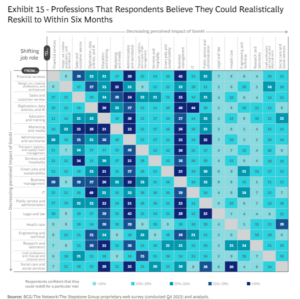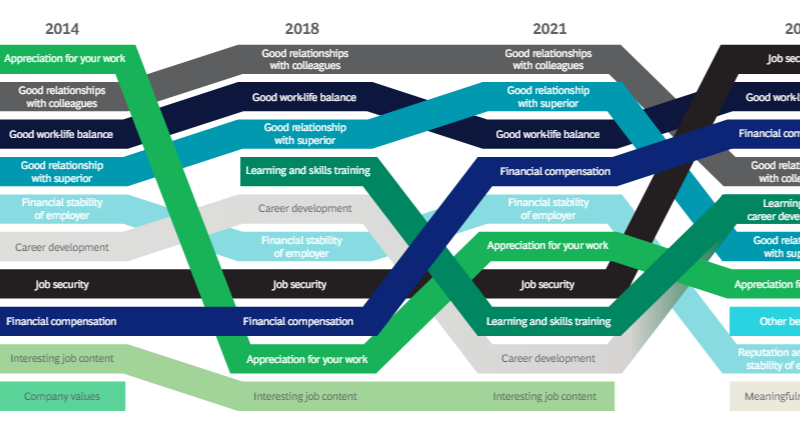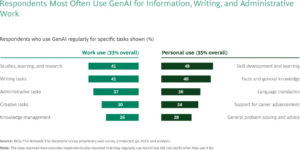Top 10 job priorities according to BCG’s Decoding Global Talent series (Graphic courtesy BCG)
The rise of generative AI is making workers concerned about their job security, Boston Consulting Group says in the latest installment on a long-running research project to track the job market.
BCG started its Decoding Global Talent series 10 years ago to get a grasp on the ever-changing talent pool. For the first seven years, “job security” came in as the seventh-most important factor among 10 factors. However, that changed in 2023, when job security jumped to the top of the heap.
The cause, according to BCG, is most likely GenAI.
“Recent headlines have suggested that the emphasis on job security may stem from restructuring in several industries or increased geopolitical uncertainty,” the company wrote in its report. “We don’t think those are the main reasons. Instead, we believe that the response mainly reflects workers’ concerns about their long-term employability.”
When BCG digs into the data from its survey, it finds that the same folks “who expressed concern about the impact of GenAI on their jobs were more likely to prioritize job security,” it says.
Technology has always impacted jobs. But GenAI brings job disruption “to a new level,” BCG writes, as it impacts “not just repetitive tasks but also creative and conceptual work.”
While GenAI is the cause of some consternation among workers, there’s no indication that it’s having widespread negative impact. BCG says its data indicate that “most workers aren’t terribly worried about AI pushing them out of their jobs.”
But at the same time, 70% of the workers surveyed by BCG “anticipate that their jobs will change, sometimes significantly, requiring them to develop new skills,” the research group wrote. “Only a quarter of respondents think that GenAI will not affect their jobs at all.”
The impacts of GenAI will take some getting used to, both for work and for play. “It’s like when Google came out or when we changed from landlines to mobile phones,” said one of BCG’s long-term interviewees for this series, Matej Hrapko, a 44-year-old living in Austria. “We needed to adapt back then, and we still do.”
On the flip side of the equation, GenAI also provides a new opportunity for workers to obtain and use new skills. In some cases, those skills may involve using GenAI itself. The majority of BCG survey-takers who use GenAI use it for information, writing, and administrative work, the group says.

Employees have pathways to move from industries more impacted by GenAI to those that are less impacted (Graphic courtesy BCG)
Regardless of what particular new skills are required, the vast majority of employees are open to reskilling. BCG’s report says that 57% of the survey-takers are open to reskilling in all situations, while another 35% say they’d be open to reskilling “but only if I had serious difficulties.” Only 8% say they would not be open to reskilling, even if facing serious problems finding a new job.
Not every industry will be subject to the same level of disruption from GenAI, which makes some jobs more protected than others. For instance, BCG puts financial services, design/art/creative professions/architecture at the top of the “most disrupted” list, while craft professionals/manual/physical work and social care/social services are at the bottom.
BCG’s survey indicate that many workers are confident they can easily reskill from one job to another. For instance, 45 survey-takers felt they could move from financial services to business management, which is in the lower half of relative GenAI impact. Another 21 folks who work in sales and customer service indicated to BCG that they could easily slide into public service and administration, also in the lower half of predicted GenAI impact.
GenAI seems to be changing how people feel about work, and what they expect from it, BCG says. For instance, it perceives a greater need for long-term job security and flexibility in learning and development. Companies that are better at adapting to these changes will have a natural advantage in the market.
“To understand how workers imagine their future careers, employers need to investigate their employees’ sentiments about and relationships to this disruptive technology,” BCG writes. “Employers may also want to know how to maximize possible productivity improvements and how to help their workers adjust to the new world of work.”
It’s not clear exactly how GenAI will impact employment. If it’s like other technological innovations, there will be some positive impacts, some negative impacts, and other unforeseen impacts (including positive, negative, and neutral). The only certainty, it would seem, is that things will change.
Related Items:
Hiring GenAI Talent: It’s a Matter of Degree
AI Is Coming for White-Collar Jobs, Too
Source link
lol


